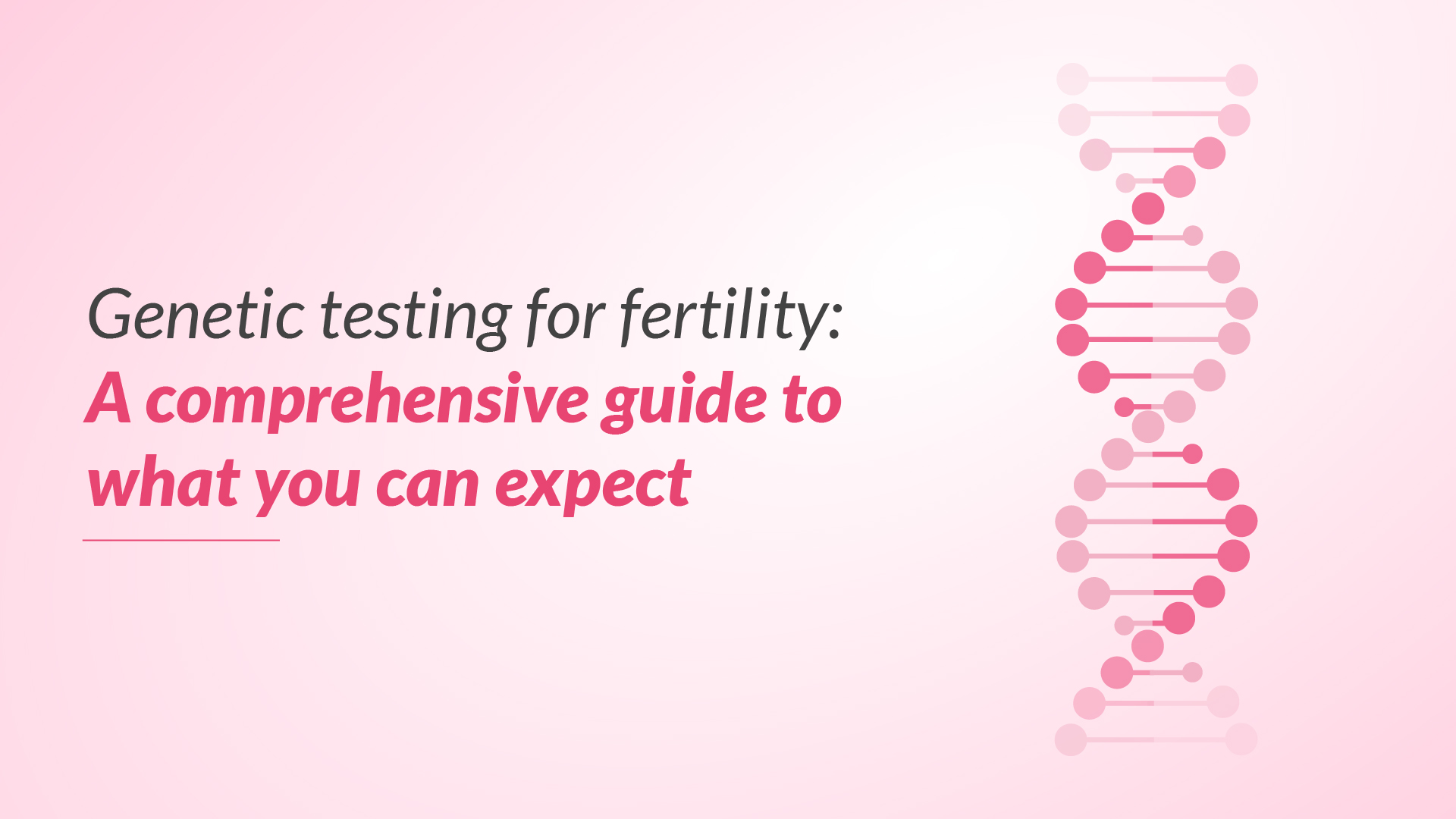Genetic Testing for Fertility: A Comprehensive Guide to What You Can Expect
Reviewed By: Dr. Anusha Kushanapally at Ferty9 Fertility Clinic, Warangal
Have you ever wondered if your genes hold the key to your fertility journey? As more couples face challenges on the path to parenthood, embryo genetic testing is emerging as a powerful tool in the world of reproductive medicine. But what exactly is genetic testing for fertility, and how could it impact your family planning?
Let's unravel the mysteries of genetic testing and its role in fertility. Whether you're just starting to think about having a baby or you've been trying to conceive for a while, understanding your genetic blueprint could be a game-changer. We'll explore what to expect from the process, the insights it can provide, and how it might shape your fertility treatment options.
What is Genetic Testing for Fertility?
Bringing a new life into the world is a beautiful journey, filled with hope, dreams, and sometimes a few uncertainties. One of those uncertainties might be the risk of passing on a genetic condition to your child. That's where genetic screening comes in.
Genetic Test can help to determine if you or your partner carry genetic variations that could potentially be passed on to your little one. Many of these conditions are inherited in what's called an "autosomal recessive" manner. This means that if both parents carry the same genetic variation, there's a 1 in 4, or 25%, chance that their child could be affected.
This test can also identify certain conditions that are passed from a mother to her son, known as X-linked conditions. While these conditions often affect boys, they can sometimes appear in girls too.
Types of Genetic Tests Available
Panel Testing
Panel testing involves analysing genes associated with a particular condition or set of disorders. In the context of fertility, panel tests may focus on genes related to reproductive health, such as those involved in ovulation, sperm production, or embryo development.
DNA Genetic Testing
DNA genetic testing examines the structure and sequence of a person's DNA to identify potential genetic mutations or variations that could impact fertility or increase the risk of passing on inherited disorders to offspring.
Single Gene Testing
Single gene testing focuses on analysing a specific gene associated with a particular genetic disorder or condition related to fertility. Doctors generally recommend this type of testing when there is a family history of a particular genetic condition or a previous screening test has indicated a potential issue.
Large Scale Genetic
Large-scale genetic testing, such as whole-exome or whole-genome sequencing, involves analysing an individual's entire genetic code or a significant portion of it. This comprehensive approach can identify a wide range of genetic variations and mutations, including those that may not be directly linked to fertility but could still impact reproductive health or the health of future offspring.
Genetic Testing Before Pregnancy
Genetic testing before pregnancy can identify genetic carriers of certain disorders, allowing couples to make informed decisions about their reproductive options and potentially pursue preimplantation genetic testing (PGT) during in vitro fertilisation (IVF) to reduce the chance of passing on inherited conditions.
Genetic Testing for Couples
Genetic testing for couples is a specialised form of testing that evaluates the genetic compatibility of partners. This type of testing can identify potential genetic risks or incompatibilities that could impact the health of future offspring or increase the likelihood of passing on inherited conditions.
Benefits of Genetic Testing
Early Detection of Diseases
Genetic testing can help determine genetic disorders or predispositions to certain conditions early on, even before symptoms appear. This early detection can facilitate timely intervention, treatment, or preventive measures, potentially improving outcomes and quality of life.
Family Planning
By identifying genetic risks or carriers of inherited conditions, couples can make informed decisions about their family planning options, such as pursuing alternative reproductive technologies or considering other options like adoption or using donor gametes.
Genetic Counselling
Genetic testing results can give valuable information for genetic counselling sessions. Genetic counsellors can help individuals and couples understand the implications of their test results, discuss potential risks and options, and provide support and guidance throughout the decision-making process.
Confirmation of Diagnosis
Genetic testing can sometimes confirm a suspected diagnosis or provide a definitive answer when other diagnostic tests are inconclusive. This can help guide appropriate treatment and management strategies.
What is Preimplantation Genetic Testing?
Preimplantation genetic testing (PGT) is a specialised form of genetic testing performed during the IVF process. It involves analysing embryos created through IVF before they are transferred to the uterus, allowing for the choice of embryos free from specific genetic disorders or chromosomal abnormalities.
PGT can be particularly advantageous for couples with a known genetic risk or a family history of certain inherited conditions. By identifying and selecting embryos without the genetic condition of concern, PGT can significantly reduce the risk of inherited disorders in the child.
Types of PGT
PGT-A (Preimplantation Genetic Testing for Aneuploidy):
PGT-A, also known as PGS (Preimplantation Genetic Screening), is a type of PGT that screens embryos for chromosomal abnormalities, such as having too many or too few chromosomes. This test can help identify embryos with the correct number of chromosomes, enhancing the chances of a successful pregnancy and lowering the risk of miscarriage or congenital disabilities.
PGT-M (Preimplantation Genetic Testing for Monogenic Disorders):
PGT-M, also known as PGD (Preimplantation Genetic Diagnosis), is a type of PGT that screens embryos for specific inherited genetic disorders caused by mutations in a single gene. This test can identify embryos unaffected by the genetic condition of concern, allowing for the selection and transfer of embryos without the disorder.
PGT-SR (Preimplantation Genetic Testing for Structural Rearrangements):
PGT-SR is a type of PGT that screens embryos for structural chromosomal rearrangements, such as translocations, inversions, or deletions. These rearrangements can increase the risk of infertility, miscarriage, or birth defects, and PGT-SR can help identify and select embryos without these structural abnormalities.
Genetic Testing for Couples
Genetic Compatibility Testing
Genetic compatibility testing is a specialised form of genetic testing that evaluates the genetic compatibility of partners. This type of testing can identify potential genetic risks or incompatibilities that could impact the health of future offspring or increase the likelihood of passing on inherited conditions.
This crucial information can help couples make informed decisions about their reproductive options and potentially pursue alternative strategies, such as using donor gametes or considering adoption.
How Genetic Testing for Couples Works
Genetic compatibility testing typically involves analysing the DNA of both partners to identify any genetic variations or mutations that could pose a risk to their future offspring. This test may include screening for specific genetic disorders, evaluating the compatibility of certain gene variants, or assessing the overall genetic compatibility of the couple.
The testing process usually involves collecting DNA samples from both partners and analysing them in a laboratory using advanced genetic testing techniques, such as DNA sequencing or microarray analysis.
Suggested Read: Genetic Testing for Inherited Conditions
When to Consider Genetic Testing for Couples
Doctors generally recommend genetic testing for couples in several situations, including:
- When one or both partners have a family history of a specific genetic disorder or inherited condition
- When one or both partners are carriers of a known genetic mutation or have a personal history of a genetic disorder
- When the couple belongs to an ethnic or racial group with a higher prevalence of certain genetic conditions
- When the couple has experienced recurrent miscarriages or fertility issues of unknown cause
- When the couple is planning to pursue assisted reproductive technologies, such as IVF or PGT.
Suggested Read: The Role of Genetics in Recurrent Implantation Failures
Genetic Testing Before IVF
How Genetic Testing Supports IVF
Genetic testing can support and enhance the success of in vitro fertilisation (IVF) treatments. By providing valuable genetic information, these tests can help identify genetic factors that can cause infertility or increase the risk of passing on inherited conditions to offspring.
One of the primary ways genetic testing supports IVF is through preimplantation genetic testing (PGT). PGT involves analysing embryos created through IVF before they are transferred to the uterus, allowing for the selection of embryos that are free from specific genetic disorders or chromosomal abnormalities.
Integrating Genetic Testing with IVF
Doctors can integrate genetic testing into the IVF process in several ways:
- Pre-IVF Genetic Testing: Couples may undergo genetic testing before starting the IVF cycle to identify potential genetic risks or carriers of inherited conditions.
- Preimplantation Genetic Testing (PGT): During the IVF cycle, embryos can be tested through PGT to screen for specific genetic disorders, chromosomal abnormalities, or other genetic factors that may influence the success of the IVF treatment or the health of the future child.
- Embryo Selection: Based on the PGT results, embryos without the genetic condition of concern or with the desired genetic characteristics can be selected for transfer, increasing the possibilities of a successful pregnancy and lowering the risk of passing on inherited disorders.
- Genetic Counselling: Genetic counsellors can provide guidance and support throughout the IVF process, helping couples understand the implications of their genetic test outcomes and make informed decisions about their reproductive options.
Suggested Read: How Counselling Helps Couples Dealing with Infertility
By integrating genetic testing with IVF, couples can maximise their possibilities of having a healthy pregnancy and child while minimising the potential risks associated with inherited genetic conditions.
Suggested Read: Embryo Transfer: What To Expect And How It Works?
Conclusion
Genetic testing for fertility has become an invaluable asset in the field of reproductive medicine, providing innumerable insights into an individual's or couple's genetic makeup and potential fertility challenges. From identifying genetic disorders and carriers to assessing genetic compatibility and supporting IVF treatments, these tests offer a comprehensive approach to understanding & addressing fertility-related issues.
By leveraging the power of genetic testing, doctors can develop personalised treatment strategies, optimise the chances of successful conception, and minimise the risk of passing on inherited conditions to future offspring.
Visit Our Clinic:
Fertility Clinic in Hyderabad
Fertility Clinic in Visakhapatnam
Fertility Clinic in Vijayawada
Fertility Clinic in Karimnagar
Fertility Clinic in Tirupati
Fertility Clinic in Rajahmundry
Fertility Clinic in Kurnool

Write your message
FAQ's
Can genetic testing predict all fertility issues?
What are the risks associated with Preimplantation Genetic Testing (PGT)?
While PGT is generally considered a safe procedure, there are some potential risks to be aware of:
- Embryo damage: There is a small risk of damaging or losing embryos during the PGT process.
- Incorrect results: In rare cases, PGT results may give inaccurate values due to technical or human errors.
What happens if a genetic compatibility test reveals risks for certain genetic disorders?
If a genetic compatibility test reveals that a couple has an increased risk of having a child with a genetic disorder, there are several options to consider:
- Preimplantation Genetic Testing (PGT): If the couple is pursuing IVF, PGT can help screen embryos and select those without the genetic condition of concern.
- Donor Gametes: The couple may consider using donor eggs or sperm to reduce the risk of passing on the genetic disorder.
- Adoption
Acceptance of Risk: In some cases, couples may choose to accept the risk and go with natural conception or IVF without PGT.


